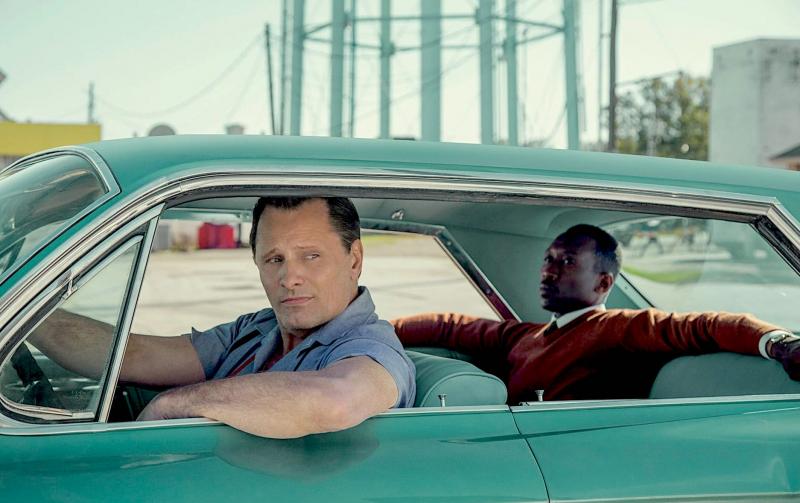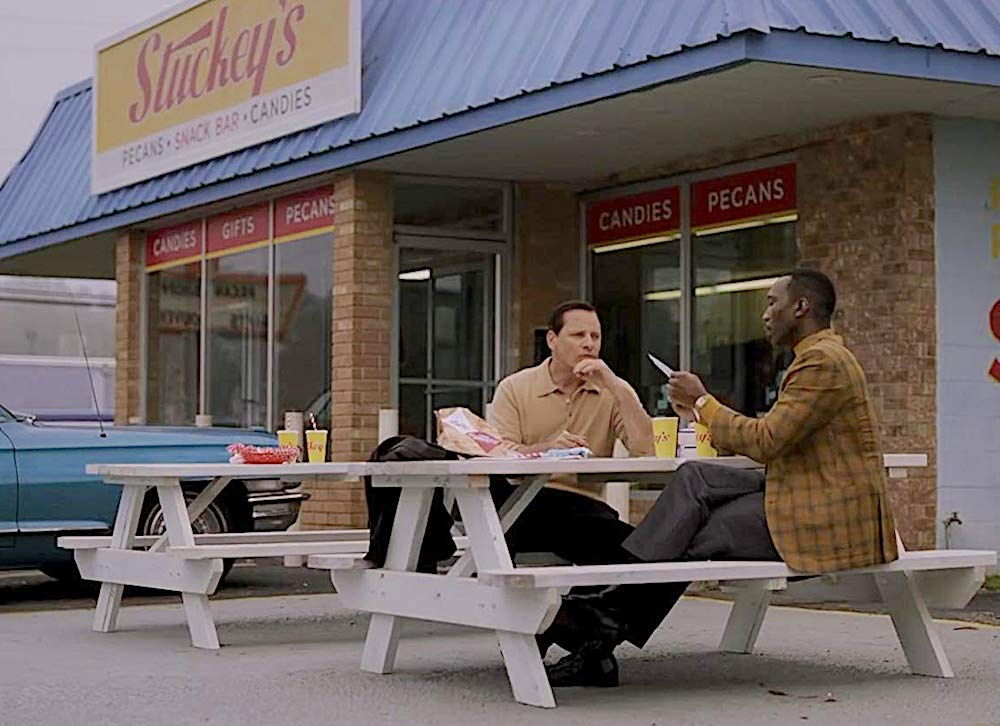Green Book review - is this Oscar hopeful too good to be true? | reviews, news & interviews
Green Book review - is this Oscar hopeful too good to be true?
Green Book review - is this Oscar hopeful too good to be true?
Two fine performances, but Peter Farrelly's movie sugar-coats the hard questions

With five nominations, Green Book is cruising optimistically towards Oscar night, but it’s not all plain sailing for director Peter Farrelly’s mixed-race fairy tale about a posh black musician and his thuggish Italian minder.
Which is a shame, because if you were able to ignore the bubbling undercurrent of unease and take it as a slice of mainstream movie-going, Green Book is touching and entertaining, and fuelled by two fine performances from its odd-couple leads, Viggo Mortensen and Mahershala Ali. Mortensen plays Tony Lip (real name Vallelonga), and we first meet him as a mob bouncer at New York’s Copacabana club. While Bobby Rydell sings to the blinged-up supper-club crowd (it’s 1962), a scuffle breaks out, and Tony wades in with both fists. He curries favour with his hoodlum boss by cunningly stealing his favourite hat from the cloakroom, then posing as the faithful servant who tracked it down for him. We see his casual racism when he finds a couple of glasses used by black workmen at his home and tosses them in the bin. By the time we’ve seen him winning a hot-dog eating competition by cramming 26 of them down his throat, we know all we need to know.
 Thus, culture shock ensues when a shutdown at the club prompts Tony to apply for a chauffeur’s job with Dr Shirley, a renowned musician who’s about to undertake a concert tour of the south. “New Jersey?” asks Tony. No, more along the lines of Alabama, Louisiana and Mississippi. Places where visiting black people are advised to equip themselves with the titular Negro Motorist Green Book, a directory of places where coloured folks might be allowed to eat or stay without being beaten up or murdered.
Thus, culture shock ensues when a shutdown at the club prompts Tony to apply for a chauffeur’s job with Dr Shirley, a renowned musician who’s about to undertake a concert tour of the south. “New Jersey?” asks Tony. No, more along the lines of Alabama, Louisiana and Mississippi. Places where visiting black people are advised to equip themselves with the titular Negro Motorist Green Book, a directory of places where coloured folks might be allowed to eat or stay without being beaten up or murdered.
One irony of the piece is that Dr Shirley is more aloof and superior than most white people. When Lip attends a job interview at his apartment above Carnegie Hall, he’s greeted by a fastidiously polite Indian manservant in full livery, and ushered into a room full of exotic china, Asian carpets and rare statuary. The Doc loftily conducts the interview from a throne of Oriental provenance (pictured above). Once he gets the job, Lip will learn that Shirley has strict rules about dress, demeanour and profane language.
The ensuing road trip becomes a mutual rite of passage as the high-life to street-life gulf between the two is spotlit by their journey through Jim Crow country. If it isn’t bad enough having to put up with Lip yakking on interminably and smoking in his car (a rather gorgeous pale green Cadillac), Shirley has to endure cockroach-infested motels and low-rent diners while the patronising white clients he’s performing for still seem to be living the pre-Civil War high life. It’s a matter of shame to him that, though he’s a Chopin specialist who studied piano at the Leningrad Conservatory, his record company have arm-twisted him into playing twiddly classical-crossover schmaltz because black people are supposed to be entertainers.
Snag is, Farrelly and co-writer Nick Vallelonga (who’s Tony Lip’s son) are too inclined to settle for the easy homily, usually delivered by the oaf-savant Tony. The square and uptight Shirley is prissy about his dietary habits, until Lip browbeats him into eating fried chicken like blue-collar schmucks (and poor blacks) do. “There are no plates or utensils,” shudders the Doc, but then finds he loves it.
 There’s a too-predictable scene where Shirley is being harassed by brutish rednecks in a bar, and has to be rescued by Lip. There’s another one where Lip loses his temper at a policeman who calls him a wop, as if that equates to the institutionalised apartheid that Shirley is subjected to. It’s great fun when Shirley, who had never heard Little Richard until Lip played him on the car radio, sits in on piano with a black bar band and rocks out like Marty McFly in Back to the Future, but the insinuation that he only achieved this boogie-enlightenment thanks to his chauffeur’s musical tutorials is beyond patronising.
There’s a too-predictable scene where Shirley is being harassed by brutish rednecks in a bar, and has to be rescued by Lip. There’s another one where Lip loses his temper at a policeman who calls him a wop, as if that equates to the institutionalised apartheid that Shirley is subjected to. It’s great fun when Shirley, who had never heard Little Richard until Lip played him on the car radio, sits in on piano with a black bar band and rocks out like Marty McFly in Back to the Future, but the insinuation that he only achieved this boogie-enlightenment thanks to his chauffeur’s musical tutorials is beyond patronising.
For all that, there’s plenty to like. Ali’s portayal of Shirley is as exquisitely pitch-perfect as his subject, and Mortensen throws himself at the Lip role like a raging bull with a little bit of a heart of gold. They just should have made it 25 years ago.
The future of Arts Journalism
You can stop theartsdesk.com closing!
We urgently need financing to survive. Our fundraising drive has thus far raised £49,000 but we need to reach £100,000 or we will be forced to close. Please contribute here: https://gofund.me/c3f6033d
And if you can forward this information to anyone who might assist, we’d be grateful.

Subscribe to theartsdesk.com
Thank you for continuing to read our work on theartsdesk.com. For unlimited access to every article in its entirety, including our archive of more than 15,000 pieces, we're asking for £5 per month or £40 per year. We feel it's a very good deal, and hope you do too.
To take a subscription now simply click here.
And if you're looking for that extra gift for a friend or family member, why not treat them to a theartsdesk.com gift subscription?
more Film
 London Film Festival - a Korean masterclass in black comedy and a Camus classic effectively realised
New films from Park Chan-wook, Gianfranco Rosi, François Ozon, Ildikó Enyedi and more
London Film Festival - a Korean masterclass in black comedy and a Camus classic effectively realised
New films from Park Chan-wook, Gianfranco Rosi, François Ozon, Ildikó Enyedi and more
 After the Hunt review - muddled #MeToo provocation
Julia Roberts excels despite misfiring drama
After the Hunt review - muddled #MeToo provocation
Julia Roberts excels despite misfiring drama
 London Film Festival 2025 - Bradley Cooper channels John Bishop, the Boss goes to Nebraska, and a French pandemic
... not to mention Kristen Stewart's directing debut and a punchy prison drama
London Film Festival 2025 - Bradley Cooper channels John Bishop, the Boss goes to Nebraska, and a French pandemic
... not to mention Kristen Stewart's directing debut and a punchy prison drama
 Ballad of a Small Player review - Colin Farrell's all in as a gambler down on his luck
Conclave director Edward Berger swaps the Vatican for Asia's sin city
Ballad of a Small Player review - Colin Farrell's all in as a gambler down on his luck
Conclave director Edward Berger swaps the Vatican for Asia's sin city
 London Film Festival - from paranoia in Brazil and Iran, to light relief in New York and Tuscany
'Jay Kelly' disappoints, 'It Was Just an Accident' doesn't
London Film Festival - from paranoia in Brazil and Iran, to light relief in New York and Tuscany
'Jay Kelly' disappoints, 'It Was Just an Accident' doesn't
 Iron Ladies review - working-class heroines of the Miners' Strike
Documentary salutes the staunch women who fought Thatcher's pit closures
Iron Ladies review - working-class heroines of the Miners' Strike
Documentary salutes the staunch women who fought Thatcher's pit closures
 Blu-ray: The Man in the White Suit
Ealing Studios' prescient black comedy, as sharp as ever
Blu-ray: The Man in the White Suit
Ealing Studios' prescient black comedy, as sharp as ever
 The Woman in Cabin 10 review - Scandi noir meets Agatha Christie on a superyacht
Reason goes overboard on a seagoing mystery thriller
The Woman in Cabin 10 review - Scandi noir meets Agatha Christie on a superyacht
Reason goes overboard on a seagoing mystery thriller
 London Film Festival 2025 - crime, punishment, pop stars and shrinks
Daniel Craig investigates, Jodie Foster speaks French and Colin Farrell has a gambling habit
London Film Festival 2025 - crime, punishment, pop stars and shrinks
Daniel Craig investigates, Jodie Foster speaks French and Colin Farrell has a gambling habit
 I Swear review - taking stock of Tourette's
A sharp and moving tale of cuss-words and tics
I Swear review - taking stock of Tourette's
A sharp and moving tale of cuss-words and tics
 A House of Dynamite review - the final countdown
Kathryn Bigelow's cautionary tale sets the nuclear clock ticking again
A House of Dynamite review - the final countdown
Kathryn Bigelow's cautionary tale sets the nuclear clock ticking again

Add comment